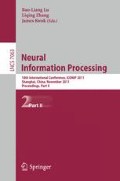Abstract
Current support vector clustering method determines the smallest sphere that encloses the image of a dataset in feature space. This sphere when mapped back to data space will form a set of contours that can be interpreted as cluster boundaries for the dataset. However this method does not guarantee that the single sphere and the resulting cluster boundaries can best describe the dataset if there are some distinctive data distributions in this dataset. We propose multi-sphere support vector clustering to address this issue. Data points in data space are mapped to a high dimensional feature space and a set of smallest spheres that encloses the image of the dataset is determined. This set of spheres when mapped back to data space will form a set of contours that can be interpreted as cluster boundaries. Experiments on different datasets are performed to demonstrate that the proposed approach provides a better cluster analysis than the current support vector clustering method.
Access this chapter
Tax calculation will be finalised at checkout
Purchases are for personal use only
Preview
Unable to display preview. Download preview PDF.
References
Bezdek, J.C.: A review of probabilistic, fuzzy and neural models for pattern recognition. Journal of Intelligent and Fuzzy Systems 1(1), 1–25 (1993)
Duda, R.O., Hart, P.E.: Pattern classification and scene analysis. John Wiley & Sons (1973)
Tran, D., Wagner, M.: Fuzzy Entropy Clustering. In: Proceedings of FUZZ-IEEE, vol. 1, pp. 152–157 (2000)
Ben-Hur, A., Horn, D., Siegelmann, H.T., Vapnik, V.: Support vector clustering. Journal of Machine Learning Research 2, 125–137 (2001)
Vapnik, V.: The nature of statistical learning theory. Springer, Heidelberg (1995)
Yang, J., Estivill-Castro, V., Chalup, S.K.: Support vector clustering through proximity graph modelling. In: Proceedings of the 9th International Conference on Neural Information Processing, vol. 2, pp. 898–903 (2002)
Tax, D.M.J., Duin, R.P.W.: Support vector data description. Machine Learning 54, 45–56 (2004)
Witten, I., Frank, E.: Data Mining: Practical Machine Learning Tools and Techniques, 2nd edn. Morgan Kaufmann (2005)
Le, T., Tran, D., Ma, W., Sharma, D.: Multiple Distribution Data Description Learning Algorithm for Novelty Detection. In: Huang, J.Z., Cao, L., Srivastava, J. (eds.) PAKDD 2011, Part II. LNCS, vol. 6635, pp. 246–257. Springer, Heidelberg (2011)
Author information
Authors and Affiliations
Editor information
Editors and Affiliations
Rights and permissions
Copyright information
© 2011 Springer-Verlag Berlin Heidelberg
About this paper
Cite this paper
Le, T., Tran, D., Nguyen, P., Ma, W., Sharma, D. (2011). Multi-Sphere Support Vector Clustering. In: Lu, BL., Zhang, L., Kwok, J. (eds) Neural Information Processing. ICONIP 2011. Lecture Notes in Computer Science, vol 7063. Springer, Berlin, Heidelberg. https://doi.org/10.1007/978-3-642-24958-7_62
Download citation
DOI: https://doi.org/10.1007/978-3-642-24958-7_62
Publisher Name: Springer, Berlin, Heidelberg
Print ISBN: 978-3-642-24957-0
Online ISBN: 978-3-642-24958-7
eBook Packages: Computer ScienceComputer Science (R0)

